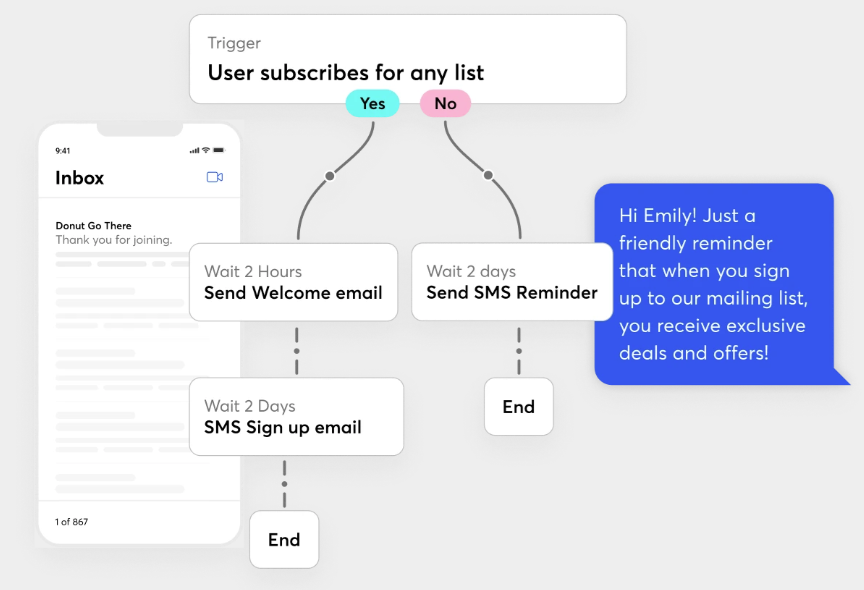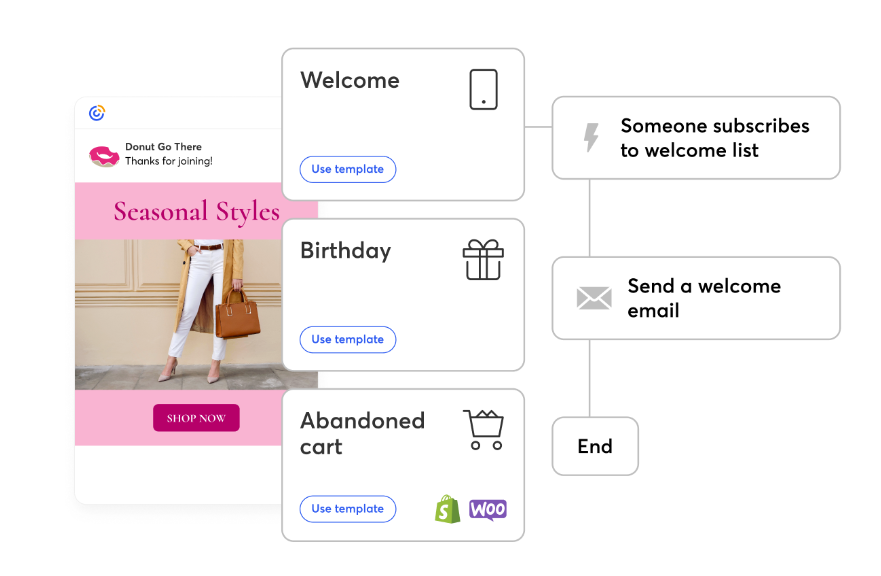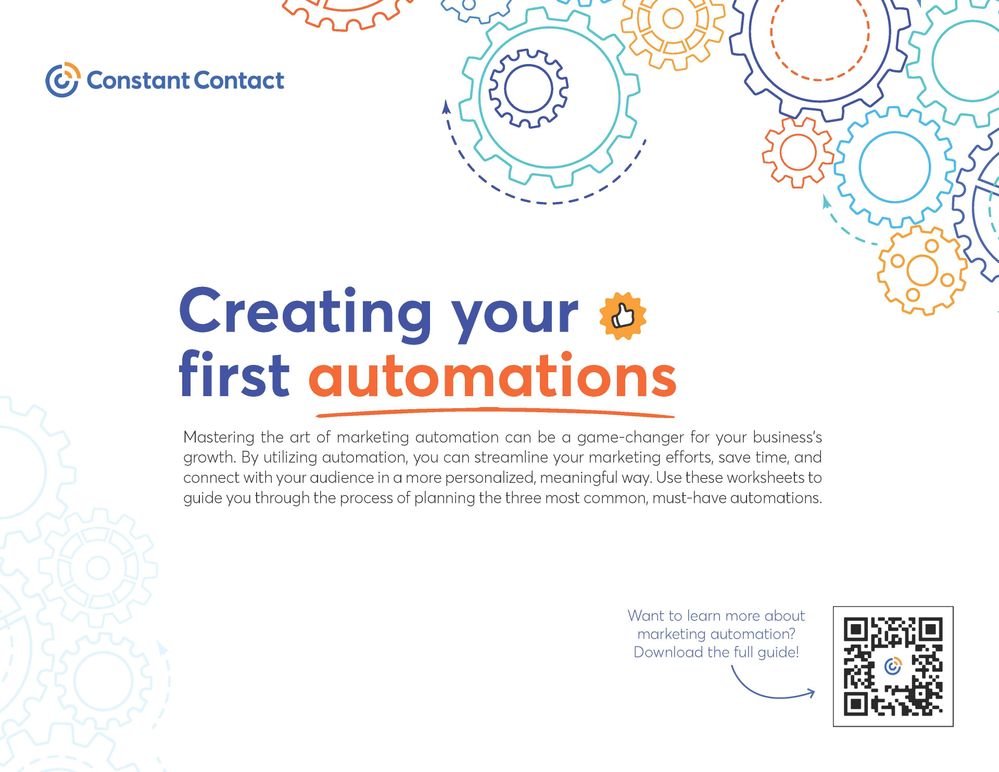
As a savvy marketing professional, you deal in the “alphabet soup” of automation tools: CRMs, AI, SMS automation, and more. Customer relationship management (CRM) and marketing automation software serve similar functions for your business, but they aren’t the same thing. CRM facilitates the sales pipeline process while marketing automation software focuses more on marketing campaigns and lead generation. Contrary to popular belief, you don’t have to choose one or the other — these tools are most effective when they work together.
In this post, we’ll cover everything you need to know about CRM and marketing automation: their uses, key differences, and how to integrate them to maximize efficiency and personalize your customers’ experiences.
CRM vs. automation: key differences
If you’re new to business marketing tools, you might think CRM and marketing automation software serve the same purpose. They share some key features, and both are designed to improve customer interactions. However, there are several key differences between the two.
What is CRM?
A customer relationship management (CRM) platform helps you keep track of your customers and maintain relationships throughout the sales process. Older versions of CRM software mainly comprised databases to store customer information. Today, however, modern CRM platforms offer end-to-end solutions to streamline lead generation.
Every CRM platform is different, but some common functions include:
- Lead management
- Email integration
- Customer contact information database
- Customer interaction tracking
- Workflow automation
- Pipeline management
- Document storage and management
CRM sales automation is a helpful feature that not all platforms offer. With CRM sales automation, you can automate basic tasks and manage your sales pipeline from a single platform. Similarly, when your CRM integrates with your marketing automation software, you can access all relevant data and tools without switching between platforms.
What is marketing automation?
Marketing automation software is a digital toolset that automates everyday marketing tasks. The exact features vary depending on your business’s needs and the software you choose. Still, they might include automated emails or social media posts, analytics and reporting, and databases to store marketing data.
There are several types of marketing automation, one of which is customer relationship management. In other words, CRM falls under the umbrella of marketing automation tools, but it isn’t the same thing — marketing automation extends beyond the CRM features listed above.
Key differences
Both CRM and marketing automation are digital programs used to automate tasks and streamline processes. Here’s how they differ:
- Purpose: The main purpose of a CRM is to manage the sales pipeline, tracking customers for the extent of their relationship with the business. Marketing automation software aims to optimize marketing efforts and bring new customers to the sales pipeline.
- Timeline: Marketing automation software generally deals with customers in the short term or for the length of a given campaign. CRM platforms manage customer relationships in the long term.
- Users: Sales teams use CRM platforms, while internal or external marketing teams use marketing automation software. These teams might overlap in some businesses, but in others, they are completely separate.
Why you need marketing automation software
Marketing automation software makes everyday marketing tasks easier. It reduces wasted time and eliminates confusion, streamlining campaign processes and saving money in the long run.
Here are a few key benefits of marketing automation software for your business:
List management and segmentation
List management may sound menial, but it’s one of the most important aspects of any marketing campaign. A lack of planning and not understanding your target audience are the main reasons marketing campaigns fail. Sending the same content to every customer on your email list with no strategy will harm your marketing efforts.
List management software allows you to store and sort customer data automatically. That way, you can target email content to certain customers without manually sorting through data sets. For example, suppose you own a clothing company and are having a sale on T-shirts. Your marketing automation software will automatically provide a list of customers who have browsed T-shirts on your website and then send information about the sale to those customers.
Triggered email and autoresponders
A triggered email is an automated message based on customer data, such as a “happy birthday” email or a reminder to visit your website after a long period of inactivity. Autoresponders are emails sent as a response to a customer’s action. These might include confirmation messages, customer service responses, or thank you messages after checkout.
Both triggered emails and autoresponders help maintain your customer relationships. They allow you to check in with customers, send reminders, and promote your brand without disrupting staff hours. Marketing automation software provides more options for triggered emails and autoresponders than a standard email server.

Nurturing leads
A traditional marketing campaign creates leads. It generates interest in your business, driving more customers toward your sales process. However, with marketing automation, you can nurture new leads and stay in touch with your customers as they continue to engage with your brand. Features of marketing automation software that help nurture leads include:
- Personalized content
- Instant email responses
- Targeted emails based on browsing or buying data
- Automated reminders after a period of inactivity
By nurturing relationships with customers interested in your brand, marketing automation tools help generate high-quality leads and drive customer conversion.
Access to marketing analytics
Another key reason many marketing campaigns fail is a lack of insight. Real-time analytics help you understand the strengths and weaknesses of your campaign, track customer engagement, calculate ROI, and see where you can improve.
Analytics is a crucial component of your marketing automation software. The best software platforms provide easy access to this data — they generate graphics and automatically update data, presenting it in a clear and easy-to-understand format. Access to marketing analytics can also help you present results to key stakeholders and plan for future marketing strategies.
Why you need CRM
Customer relationship management software helps to streamline your sales processes and maintain long-term relationships with existing customers. It works alongside other marketing automation tools to save time and money, reduce errors, and simplify everyday tasks.
Here are some crucial benefits of the best CRM platforms:
A clear overview of your customer journey
Your customer journey is the path customers take as they interact with your brand. Every business has a unique customer journey — depending on your product or service, your customer journey might end with the first purchase or strive to create lifelong customers.
The right CRM tools give you insight into every aspect of your customer journey. With automated data tracking and real-time analytics, you can see when a customer first interacts with your brand, how long they spend on your website, if they visit again after their initial purchase, and more. This insight allows you to troubleshoot problems and spot areas for improvement.
For example, your CRM software might show that many customers spend less than five minutes on your website. You can use that data to improve your site’s user experience (UX) and re-target potential customers who visit briefly.
Integration between marketing channels
One challenge of modern digital marketing is coordinating your campaigns across multiple channels. Some of the most common channels marketers use today include:
- Social media
- SEO blog posts
- Email marketing
- Pay-per-click ads
- Video marketing
- Affiliate marketing
It’s important to synchronize your tone and messaging across all channels. Your brand should be as recognizable on social media as it is in an email. However, manually tailoring content for each channel makes it easy for your message to get jumbled.

The best CRM platforms integrate with all major marketing channels, including your social media accounts, email server, and website. Your marketing team can easily access social media posts while drafting an email or work website links into your blog posts and press releases. The result is a clean, streamlined brand that remains consistent across all channels.
Automating tedious marketing tasks
Like marketing automation software, CRM platforms take basic tasks off your team members’ hands. Those tasks include:
- Recording and updating customer data
- Transferring data from marketing databases to sales databases
- Sending welcome emails
- Reaching out to disengaged customers
- Sending appointment reminders
- Calculating customer acquisition and retention rates
The benefits of marketing automation integration go beyond saving time. Automated tasks also reduce the risk of error in your data management and analytics. On top of that, automation frees up time for other tasks, allowing your sales team to spend more time personally interacting with customers and implementing creative solutions.
Integrating your CRM & marketing automation
Automation and personalization might seem like opposing ideas, but with the right tools, it’s possible to make marketing automation and personalization work together. One of the best ways to do that is to integrate all the tools in your arsenal, including your CRM and marketing automation software.
Again, marketing automation generates and nurtures leads, while CRM maintains customer relationships and drives sales. When these two platforms work together, you’ll get automated processes that help to personalize each customer’s experience and streamline the entire customer journey.
Some benefits of integrating your CRM and marketing automation software include:
Eliminating overlap
Although CRM and marketing automation are different platforms, they have some of the same functions — for example, automated emails. Integrating these two platforms reduces the risk of overlap and duplicates. In other words, you can avoid sending the same email twice. Eliminating overlap also helps to ensure your analytics are as accurate as possible.
Expanding oversight
When your CRM platform and marketing automation tools work together, you’ll have a bird’s-eye-view of the entire marketing and acquisitions process, from end-to-end. Integrating these two platforms will create shared databases to track a customer’s data from their first interaction with your brand to their final purchase.
Streamlined marketing-to-sales handoff
In a traditional sales pipeline, leads are generated by the marketing team and passed to the sales team. Integrating your CRM and marketing automation software streamlines the handoff process. Customers in your marketing databases are automatically entered into your CRM databases. When the sales team takes over customer interactions, they’ll have all the data they need to personalize each customer’s experience and ensure a smooth sale.
This is also a benefit for smaller businesses that handle their sales and marketing under a single team. Integration gives you all the tools you need to run a marketing campaign and manage customer relationships without wasting time on manual processes.
Make your CRM & marketing automation work for you
A CRM platform and marketing automation software are different tools. Although they have some overlap, their goals are essentially different: CRMs are focused on managing the sales pipeline and driving customer acquisitions, while marketing automation generates and nurtures leads. Both of these tools will help your business grow, especially when they work together.
Integrating your CRM and marketing automation creates a more efficient, personalized process from end to end. With the right platform, you can seamlessly integrate these tools and make them both work for you.

FAQ
What part of my marketing can I automate?
Many repetitive or tedious marketing tasks can be automated, including sending email responses, collecting and sorting customer data, sending reminders, and more. Automating these tasks with marketing automation software will save you time and reduce the risk of errors.
Do I need a CRM for a small business or startup?
Not all businesses use CRM platforms. CRMs are most popular in retail, technology, banking, and finance industries. Ultimately, deciding which tools are right for your business is up to you. However, CRM platforms are designed for businesses of all sizes, and a startup or small business will benefit from a CRM as much as a larger business.
Is CRM a part of marketing automation?
Marketing automation is an umbrella term that encompasses several automated tasks, some of which may also be covered by a CRM platform. However, customer relationship management and marketing automation are ultimately different tools that accomplish different goals.




